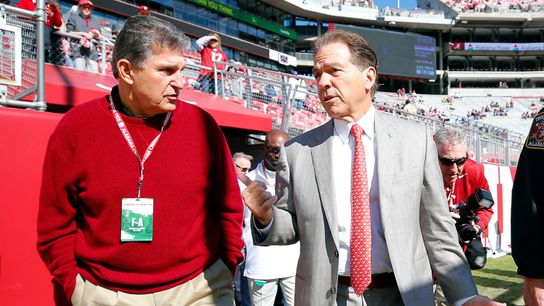Appearing on Capitol Hill for a roundtable discussion regarding both the future of collegiate athletics and the nebulous Name, Image and Likeness collectives and payments that are pervading the landscape, Alabama’s Nick Saban, athletics director Greg Byrne and ACC Commissioner Jim Phillips, among others, cautioned the end of women’s collegiate sports – and additional non-revenue teams – could arrive in the very near future.
Speaking at an event organized by Texas Sen. Ted Cruz, Byrne offered a stark portrait with specific details of the collegiate landscape – without the engine powered by big business college football, and, to an lesser extent, men’s college basketball at many institutions.
“If it weren’t football, we would not have 21 sports at the University of Alabama,” said Byrne, who revealed his Crimson Tide athletics department had a $40 million shortfall last year that was erased by revenues from the school’s powerhouse football and Nate Oats’ men’s basketball programs. “We do not want to see college sports lose women’s sports and Olympic sports.”
The discussion focused not only on NIL collectives but also veered into talks about the NCAA Transfer Portal, the potential to make student-athletes employees of their respective institutions and what could potentially happen in the event of such a drastic change.
Phillips, the ACC head who took over the conference after time as Northwestern’s athletics director, said athletes labeled as employees and in a revenue-sharing system would leave likely only football and men’s basketball as male sports offerings and then women’s athletics would be limited to an equivalent number of scholarship female student-athletes being compensated. That number would likely be slightly less than 100 paid student-athletes; football at the NCAA’s Football Bowls Subdivision level allows for 85 scholarship student-athletes; basketball is afforded 13 scholarship slots.
“You can go from 28 to six sports in one fiscal year,” Phillips cautioned.
Saban, who retired in January but has remained a special advisor to Alabama, spoke candidly about the sea change in collegiate athletics and how much it expedited his retirement.
“All the things that I’ve believed in for all these years, 50 years in coaching, no longer exist in college athletics,” Saban told the standing-room-only crowd in Washington, D.C. “It always was about developing players, it always was about helping people be more successful in life. My wife (Terry) even said to me, we would have all the recruits over on Sunday with their parents for breakfast, and she would always meet with the mothers and talk about how she was going to help impact their sons and how they would be well taken care of.
“And she came to me right before I retired and said, ‘Why are we doing this?’ I said, ‘What do you mean?’ She said, ‘All they care about is how much you’re going to pay them. They don’t care about how much you’re going to develop them. Which is what we’ve always done, so why are you doing this?’.”
